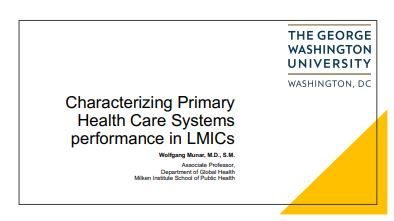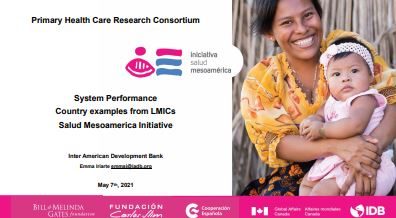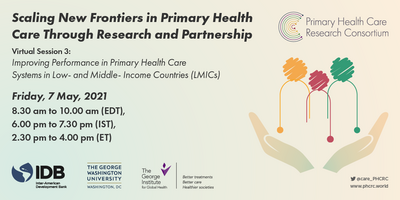
Seven tips on performance management, quality improvement and research for primary health care in low- and middle-income countries.
The PHCRC, in collaboration with Dr Wolfgang Munar from Milken Institute School of Public Health, George Washington University, and Mr Diego Rios-Zertuche from the Salud Mesoamerica Initiative hosted episode no 3 of its webinar series on the 7th of May. This session was moderated by Dr Rajani Ved and included presentations from the two speakers on improvement of performance in primary health care systems in LMICs with examples from Mesoamerica. The presentations were followed by a lively Q&A session which was enriched by perspectives of our participants - academics, program managers, primary care practitioners from 42 countries. The PHCRC extends appreciation to everyone who participated in this event to make it a success.
 Dr Robert Mash, Chair of the Steering Committee of the PHCRC summarises the discussions and presents seven tips on performance management.
Dr Robert Mash, Chair of the Steering Committee of the PHCRC summarises the discussions and presents seven tips on performance management.
Thanks to Prof Wolfgang Munar and Mr Diego Rios-Zertuche for sharing their work on performance management in primary health care at a webinar hosted by the Primary Health Care Research Consortium. Prof Munar presented a framework for thinking about performance management and an evidence gap map, showing what we know and don’t know. Mr Rios-Zertuche presented the work of the Salud Mesoamérica Initiative, improving primary health care in Central America.
Having listened to the talks and the discussion I have lifted out seven tips.
Tip 1: Measure to act: Measurement of performance with feedback and a process of sense-making can make people more accountable, help people learn and motivate change. We should therefore ensure that we ‘measure to act’ and avoid collecting data to measure things that do not enable action. It is also implied that measurement should be combined with feedback and reflection to connect measurement with action to improve performance. Rapid cycles of measurement, learning, planning and action are useful to improve quality.
Tip 2: Address all levels of the system: This process of measurement, feedback and sense-making that leads to improvement planning and implementation should be enabled at different levels. The micro-level (individuals), the meso-level (teams and organisations, facilities, districts) as well as the macro-level (inter-organisational, national).
Tip 3: Focus on motivation to change: One of the key research questions is what strategies affect intrinsic individual as well as collective motivation to improve performance. In answering this question, we may need to look beyond traditional health sciences and methods, such as clinical trials, and embrace social science theory and methods. Coaching and mentoring approaches may be useful.
Tip 4: Look at how information is used: Smaller datasets that are aligned across levels of the health system and with clear system goals for improvement may be more useful than large datasets. Data is often collected that is not aligned with the system’s goals and not intended to support action. We need to define this dataset and ensure it is also comprehensive to address the whole system and not biased towards a particular disease or programme. Research needs to look beyond measuring the effectiveness of different interventions and explore how they worked, why they worked and for whom.
Tip 5: Use systems thinking and complexity theory: Health systems have multiple complex processes and relationships that influence performance. Research methods should reflect this reality and avoid assuming simplistic linear cause-and-effect relationships. We may need a new methodological toolkit to do this. Sometimes small and relatively minor interventions can lead to substantial improvement in performance – a feature of complex systems. A challenge though is how to sustain improvements over time.
Tip 6: Accountability is a two-way street: While measuring to act makes health care providers more accountable for their performance, the system should also enable these same providers to hold their managers, decision-makers and policy-makers accountable to support improved performance with the necessary resources and inputs.
Tip 7: Competency is needed at the local level: Primary health care teams need to be competent in the cyclical process of measurement, receiving feedback, making sense of the information, planning change and implementing change. Primary care providers are not often trained to have these competencies and organisational culture does not always support local innovation and learning. Approaches to performance management can be seen on a spectrum from directive (controlling providers) to enabling (encouraging agency and stewardship of the system). In low and middle-income countries teams are often made up of community health workers and nurses with little education or training. In Central America teams were all supported by doctors, but even doctors need to be trained better to support performance management and improvement.
Presentations from the session are here
Watch the video recordings Virtual Session 3: Improving Performance in Primary Health Care Systems in LMICs




